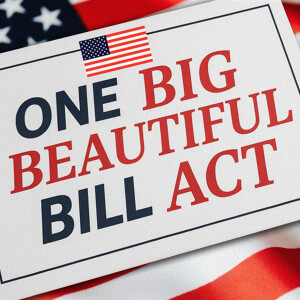
This week Angela continues the discussion on the One Big Beautiful Bill Act. This episode focuses on student loans, charitable gifting, new tax legislation for individuals, and new tax legislation for businesses and farmers. The aim is to provide a broad overview to prompt listeners to inquire about potential impacts on their financial situations.
Key Takeaways 💡
- The One Big Beautiful Bill Act introduces a lifetime borrowing cap for student loans, with graduates capped at $100,000 and medical/law students at $200,000, and further limitations for part-time students. Parent Plus loans now have a cap of $65,000, and repayment options have been simplified to just two choices, making it crucial to understand the implications for financial aid planning.
- The new tax legislation introduces a 0.5% income floor for charitable write-offs, impacting the ability to deduct charitable gifts, and this floor also applies to corporations. This change means that individuals must now exceed this income threshold before they can begin to deduct their charitable contributions, potentially reducing the tax benefits of charitable giving.
- The "no tax on tips, overtime, and Social Security" claims are misleading, as the legislation only provides exemptions on some tips, some overtime, and some Social Security income. There's an above-the-line exemption of $25,000 for qualified tips, but this phases out for higher incomes, and overtime has a $12,500 exemption with the requirement of separate reporting on the W-2, both clauses being eligible for only three years.
- The "no tax on Social Security" is more of a senior deduction of $6,000 for those over 65, but it phases out for individuals with incomes starting at $75,000 or $150,000 for married couples filing jointly. This means that the promised benefits may not be as substantial as initially perceived, especially for seniors with higher incomes.
- The legislation allows for 100% depreciation and bonus depreciation in one year, increasing the limits around Section 179 expensing up to $2.5 million. Additionally, certain qualified property used for manufacturing, agriculture, chemical production, or refining can be expensed at 100% in one year, though there are strong recapture rules over 10 years to consider.
- Environmental quality incentives programs, conservation steward programs, and the agriculture conservation easement program have been funded through 2031, with increased funding due to the redirection of Inflation Reduction Act funds. There is also renewed funding through 2031 for smaller initiatives like well water programs and incentivizing farmers to open land for hunting and recreation, plus a feral swine eradication program for Texas.
- The bill includes $66 billion in new spending for farm programs, the largest infusion since 2002, covering commodity programs, crop insurance, conservation, trade promotion, research, education, rural development, energy programs, and support for specialty crops. This presents numerous opportunities for farmers and ranchers to tap into various resources and programs.
- The qualified small business stock exemption has been expanded, reducing the holding period to three years for partial gain exemptions, with 50% of gains not taxed at three years, 75% at four years, and 100% at five years. The exemption cap has also been increased to $15 million or 10 times the owner's basis, offering significant benefits for small business owners planning their exit strategies.
Version: 20241125
No comments yet. Be the first to say something!